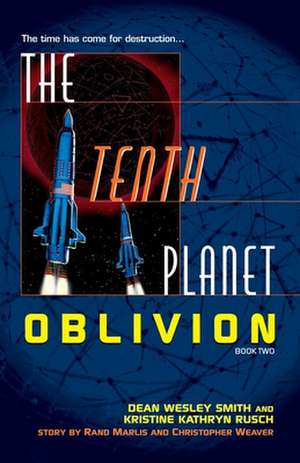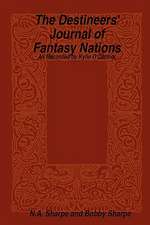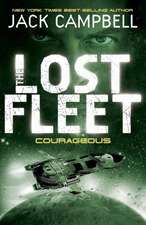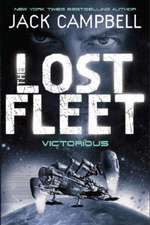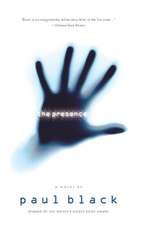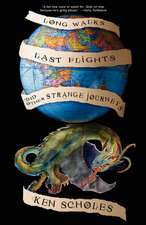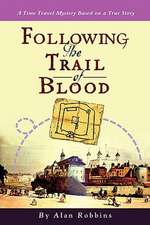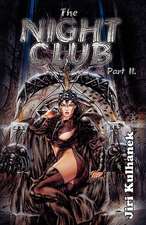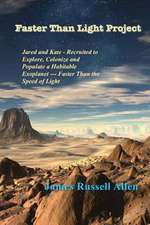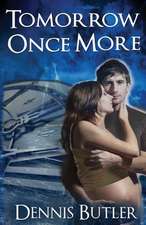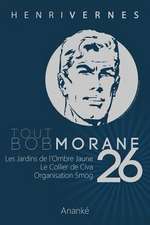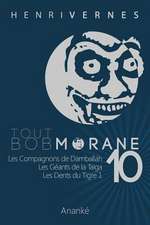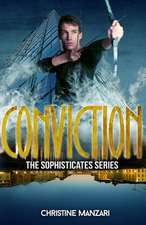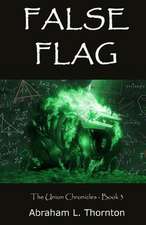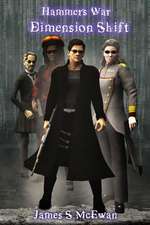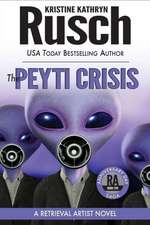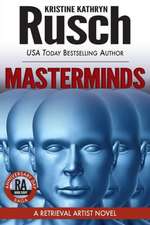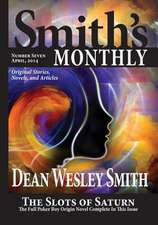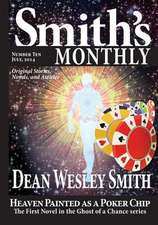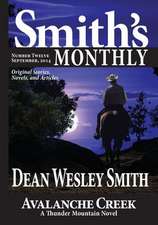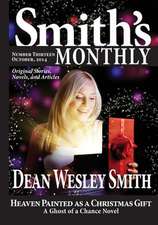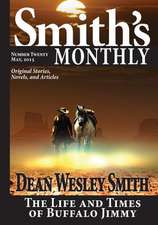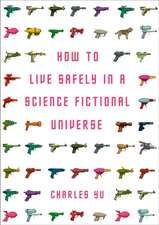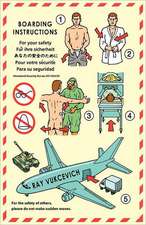The Tenth Planet: Book 2
Autor Dean Wesley Smith, Kristine Kathryn Ruschen Limba Engleză Paperback – 31 ian 2000
For aeons, Earth has been ravaged by so-called natural disasters. Now we know the primary cause: overharvesting of our limited resources--not by humans, but by the residents of our solar system's tenth planet.
Since before the birth of humanity, every two thousand years, this dark planet has plundered our world. But in 2017, Earth fought back. Now thousands of aliens face starvation. To survive, they must harvest Earth when their orbit brings them back from behind the sun.
But the humans are not waiting for Earth to become as parched and barren as Mars. Every nuclear weapon has been aimed at the Tenth Planet. Their ultimate goal--to blow the Tenth Planet to oblivion.
In part two of the Tenth Planet saga, cutting-edge science and high drama combine in an adventure that questions humanity's history, our place in the universe . . . and our very right to exist.
From the Paperback edition.
| Toate formatele și edițiile | Preț | Express |
|---|---|---|
| Paperback (2) | 111.83 lei 3-5 săpt. | |
| Del Rey Books – 31 ian 2000 | 111.83 lei 3-5 săpt. | |
| Del Rey Books – 30 apr 1999 | 111.99 lei 3-5 săpt. |
Preț: 111.83 lei
Nou
Puncte Express: 168
Preț estimativ în valută:
21.41€ • 23.26$ • 17.99£
21.41€ • 23.26$ • 17.99£
Carte disponibilă
Livrare economică 31 martie-14 aprilie
Preluare comenzi: 021 569.72.76
Specificații
ISBN-13: 9780345484949
ISBN-10: 0345484940
Pagini: 272
Dimensiuni: 140 x 216 x 15 mm
Greutate: 0.35 kg
Editura: Del Rey Books
ISBN-10: 0345484940
Pagini: 272
Dimensiuni: 140 x 216 x 15 mm
Greutate: 0.35 kg
Editura: Del Rey Books
Notă biografică
Considered one of the most prolific writers working in modern fiction, USA Today bestselling writer Dean Wesley Smith published almost two hundred novels in forty years, and hundreds and hundreds of short stories across many genres.
At the moment he produces novels in several major series, including the time travel Thunder Mountain novels set in the Old West, the galaxy-spanning Seeders Universe series, the urban fantasy Ghost of a Chance series, a superhero series starring Poker Boy, and a mystery series featuring the retired detectives of the Cold Poker Gang.
His monthly magazine, Smith's Monthly, which consists of only his own fiction, premiered in October 2013 and offers readers more than 70,000 words per issue, including a new and original novel every month.
During his career, Dean also wrote a couple dozen Star Trek novels, the only two original Men in Black novels, Spider-Man and X-Men novels, plus novels set in gaming and television worlds. Writing with his wife Kristine Kathryn Rusch under the name Kathryn Wesley, he wrote the novel for the NBC miniseries The Tenth Kingdom and other books for Hallmark Hall of Fame movies.
He wrote novels under dozens of pen names in the worlds of comic books and movies, including novelizations of almost a dozen films, from The Final Fantasy to Steel to Rundown.
Dean also worked as a fiction editor off and on, starting at Pulphouse Publishing, then at VB Tech Journal, then Pocket Books, and now at WMG Publishing, where he and Kristine Kathryn Rusch serve as series editors for the acclaimed Fiction River anthology series, which launched in 2013. In 2018, WMG Publishing Inc. launched the first issue of the reincarnated Pulphouse Fiction Magazine, with Dean reprising his role as editor.
For more information about Dean's books and ongoing projects, please visit his website at www.deanwesleysmith.com and sign up for his newsletter.
Extras
April 23, 2018
7:30 p.m. Eastern Time
174 Days Until Second Harvest
The Oval Office smelled musty. That was always the first thing Secretary of State Doug Mickelson noticed about the place. Then he noted the large blue area rug with the emblem of the United States in the center, the antique partner's desk beneath the large windows where President Franklin did most of his work, and the white couches nearest the door. The room's oval shape wasn't that obtrusive--the first time he'd been invited here, Mickelson had thought it would be--but the relatively low ceiling and the comfortable furniture kept
it from feeling like a mausoleum, as so much of the White House did.
Still, all the years the building had stood in the District's damp heat in the days before air-conditioning had taken their toll. There was a general mustiness about the whole building, something an army of cleaning people couldn't seem to tame. Once, when Mickelson mentioned that the faint pervasive hint of mold played hell on his allergies, his best friend, scientist Leo Cross, had suggested using nanotechnology to clean it out. Mickelson had thought it a good idea at the time. Now, thanks to the alien attack, he understood how nanotechnology worked--had actually seen it in action--and he would rather live with the mold.
He dropped his tall, muscled frame onto the couch, almost tempted to put his feet up. He couldn't remember being so worn out and so angry at the same time. Since the attack he'd had almost no sleep, and had wanted to punch a dozen people, even though he was known for his calmness under diplomatic fire. He was just boiling mad that the aliens had so easily destroyed so much of his home, his country, his planet.
He was amazed the world had survived an alien attack. Thank God it looked as if humans had won when the aliens left, otherwise the world would be coming apart in riots. At the moment almost everyone on the planet thought humanity had chased off the aliens. Doug knew better.
So did President Franklin and about thirty other people around the nation. And maybe a few hundred more around the world. But that was going to change.
The aliens hadn't been chased off--they were just following a plan. A plan that was going to bring them right back to Earth for a second attack as soon as their tenth-planet home got into position again.
And the fact that they were coming back had him even angrier. And scared at the same time. Not for himself, but for the millions and millions who would die in a second attack, not counting all the people who would die in the panic that would sweep the world the moment everyone knew the aliens were headed this way again.
Humanity, civilization as Mickelson knew it, wouldn't survive a second round. It was that simple.
Mickelson heard President Franklin in the narrow corridor off the opposite side of the room, his braying Bronx accent impossible to miss. Thayer Franklin had a patrician name, but that was the only thing patrician about him. His father was distantly related to some of the best families in New England, but he'd married "down," or so the pre-election news reports had said, to a woman from a blue-collar family who'd gotten a scholarship to Harvard. That marriage had lasted long enough to produce Franklin, and to prevent his spunky mother from finishing her Ivy League education. Franklin's father refused to pay child support, and Cara Franklin went home to raise her child.
That was all in the official biography. What wasn't, seemed incredibly clear to anyone who met the small, dark-eyed, clear-spoken mother of the president. She'd poured her ambition into him, and he'd responded. Sometimes, Mickelson thought, the entire success story was an elaborate way for Franklin to thumb his nose at his still-living, unrepentant deadbeat father.
Now Franklin was faced with the largest crisis to ever face a president. Mickelson hoped the man was up for it.
Mickelson leaned his head back and closed his eyes. Most of the time over the past few days, when he did that, either in bed or on a plane, he saw the images of the alien craft pouring the black clouds of nanomachines over people, buildings, entire towns. And those people screaming in pain as the machines ate them alive, from the outside inward.
It was the stuff of horror movies. Skin eaten, blood spurting everywhere.
Faces contorted in pain, covered in blood, skin gone.
Millions of dead.
Nightmares.
Nothing but nightmares.
"Napping on me, Doug?" President Franklin's voice broke through the images of the attack as he closed the door to his inner office behind him.
"Hardly," Doug said, opening his eyes to see the intense gaze of his friend. "Every time I try to sleep I see the attack again."
Franklin dropped down into his normal chair, his back to his desk, and nodded. The exhaustion was clear around the man's black eyes and wrinkled face. Franklin had grown tired looking over his first years in office, but this alien attack had added years to his face.
"So do I, Doug," Franklin said. "And to be honest with you, it's making me damn angry."
"You and a lot of other people," Doug said. He'd spent the last few days on emergency trips to meet with heads of states, calming people, letting them know something was going to be done. "But everyone feels so helpless, at least those who know about the aliens coming back again."
"How many know?" Franklin asked.
Doug shook his head. "Not many at this point. Less than a couple hundred, but it won't take long for others to start figuring it out."
"And the rest of the world, those who don't know?" Franklin asked. "How do you see them taking it?"
"Shock," Doug said, used to having Franklin quiz him on common people's reactions around the world. "Mourning the dead. And celebration that the aliens are gone and that we won."
Franklin snorted. "We didn't win. I'm not sure we even really bothered the bastards."
Mickelson couldn't agree more.
"Well," Franklin said, his voice turning cold and low. "That's not going to happen next time. We're not going to just let them come here, take what they want, and kill our people."
Mickelson knew this wasn't just another of Franklin's speeches. He had known Franklin long enough to see when all the political screens and faces were gone and he was being the real Franklin. And this was one of those times.
But unless something major had changed in the last few hours while Mickelson had been on the plane home from Great Britain, there wasn't any way to stop the aliens that he knew of.
"Oh," Mickelson said, sighing and leaning back. "I wish it were that easy."
Franklin pinned Mickelson with his stare, the anger clearly being held in check just below the surface. "I've seen enough death over the past week to last me a thousand lifetimes. Those bastards aren't going to do it again."
Mickelson sat forward and faced his president. "You have a way to stop them?"
"Damn right I do," Franklin said. "We're going to blow that damn planet of theirs right out of the system before they get another chance to hurt us."
For a second Mickelson didn't understand exactly what the president was telling him. The words seemed to make no sense.
"We're going to attack them?" Mickelson said.
Franklin smiled, but there was no merriment behind the smile or in his eyes. "You bet your ass we're going to," President Franklin said. "And they're not even going to know what hit them."
From the Paperback edition.
7:30 p.m. Eastern Time
174 Days Until Second Harvest
The Oval Office smelled musty. That was always the first thing Secretary of State Doug Mickelson noticed about the place. Then he noted the large blue area rug with the emblem of the United States in the center, the antique partner's desk beneath the large windows where President Franklin did most of his work, and the white couches nearest the door. The room's oval shape wasn't that obtrusive--the first time he'd been invited here, Mickelson had thought it would be--but the relatively low ceiling and the comfortable furniture kept
it from feeling like a mausoleum, as so much of the White House did.
Still, all the years the building had stood in the District's damp heat in the days before air-conditioning had taken their toll. There was a general mustiness about the whole building, something an army of cleaning people couldn't seem to tame. Once, when Mickelson mentioned that the faint pervasive hint of mold played hell on his allergies, his best friend, scientist Leo Cross, had suggested using nanotechnology to clean it out. Mickelson had thought it a good idea at the time. Now, thanks to the alien attack, he understood how nanotechnology worked--had actually seen it in action--and he would rather live with the mold.
He dropped his tall, muscled frame onto the couch, almost tempted to put his feet up. He couldn't remember being so worn out and so angry at the same time. Since the attack he'd had almost no sleep, and had wanted to punch a dozen people, even though he was known for his calmness under diplomatic fire. He was just boiling mad that the aliens had so easily destroyed so much of his home, his country, his planet.
He was amazed the world had survived an alien attack. Thank God it looked as if humans had won when the aliens left, otherwise the world would be coming apart in riots. At the moment almost everyone on the planet thought humanity had chased off the aliens. Doug knew better.
So did President Franklin and about thirty other people around the nation. And maybe a few hundred more around the world. But that was going to change.
The aliens hadn't been chased off--they were just following a plan. A plan that was going to bring them right back to Earth for a second attack as soon as their tenth-planet home got into position again.
And the fact that they were coming back had him even angrier. And scared at the same time. Not for himself, but for the millions and millions who would die in a second attack, not counting all the people who would die in the panic that would sweep the world the moment everyone knew the aliens were headed this way again.
Humanity, civilization as Mickelson knew it, wouldn't survive a second round. It was that simple.
Mickelson heard President Franklin in the narrow corridor off the opposite side of the room, his braying Bronx accent impossible to miss. Thayer Franklin had a patrician name, but that was the only thing patrician about him. His father was distantly related to some of the best families in New England, but he'd married "down," or so the pre-election news reports had said, to a woman from a blue-collar family who'd gotten a scholarship to Harvard. That marriage had lasted long enough to produce Franklin, and to prevent his spunky mother from finishing her Ivy League education. Franklin's father refused to pay child support, and Cara Franklin went home to raise her child.
That was all in the official biography. What wasn't, seemed incredibly clear to anyone who met the small, dark-eyed, clear-spoken mother of the president. She'd poured her ambition into him, and he'd responded. Sometimes, Mickelson thought, the entire success story was an elaborate way for Franklin to thumb his nose at his still-living, unrepentant deadbeat father.
Now Franklin was faced with the largest crisis to ever face a president. Mickelson hoped the man was up for it.
Mickelson leaned his head back and closed his eyes. Most of the time over the past few days, when he did that, either in bed or on a plane, he saw the images of the alien craft pouring the black clouds of nanomachines over people, buildings, entire towns. And those people screaming in pain as the machines ate them alive, from the outside inward.
It was the stuff of horror movies. Skin eaten, blood spurting everywhere.
Faces contorted in pain, covered in blood, skin gone.
Millions of dead.
Nightmares.
Nothing but nightmares.
"Napping on me, Doug?" President Franklin's voice broke through the images of the attack as he closed the door to his inner office behind him.
"Hardly," Doug said, opening his eyes to see the intense gaze of his friend. "Every time I try to sleep I see the attack again."
Franklin dropped down into his normal chair, his back to his desk, and nodded. The exhaustion was clear around the man's black eyes and wrinkled face. Franklin had grown tired looking over his first years in office, but this alien attack had added years to his face.
"So do I, Doug," Franklin said. "And to be honest with you, it's making me damn angry."
"You and a lot of other people," Doug said. He'd spent the last few days on emergency trips to meet with heads of states, calming people, letting them know something was going to be done. "But everyone feels so helpless, at least those who know about the aliens coming back again."
"How many know?" Franklin asked.
Doug shook his head. "Not many at this point. Less than a couple hundred, but it won't take long for others to start figuring it out."
"And the rest of the world, those who don't know?" Franklin asked. "How do you see them taking it?"
"Shock," Doug said, used to having Franklin quiz him on common people's reactions around the world. "Mourning the dead. And celebration that the aliens are gone and that we won."
Franklin snorted. "We didn't win. I'm not sure we even really bothered the bastards."
Mickelson couldn't agree more.
"Well," Franklin said, his voice turning cold and low. "That's not going to happen next time. We're not going to just let them come here, take what they want, and kill our people."
Mickelson knew this wasn't just another of Franklin's speeches. He had known Franklin long enough to see when all the political screens and faces were gone and he was being the real Franklin. And this was one of those times.
But unless something major had changed in the last few hours while Mickelson had been on the plane home from Great Britain, there wasn't any way to stop the aliens that he knew of.
"Oh," Mickelson said, sighing and leaning back. "I wish it were that easy."
Franklin pinned Mickelson with his stare, the anger clearly being held in check just below the surface. "I've seen enough death over the past week to last me a thousand lifetimes. Those bastards aren't going to do it again."
Mickelson sat forward and faced his president. "You have a way to stop them?"
"Damn right I do," Franklin said. "We're going to blow that damn planet of theirs right out of the system before they get another chance to hurt us."
For a second Mickelson didn't understand exactly what the president was telling him. The words seemed to make no sense.
"We're going to attack them?" Mickelson said.
Franklin smiled, but there was no merriment behind the smile or in his eyes. "You bet your ass we're going to," President Franklin said. "And they're not even going to know what hit them."
From the Paperback edition.
